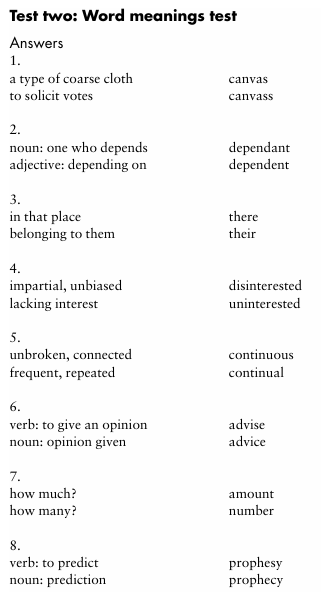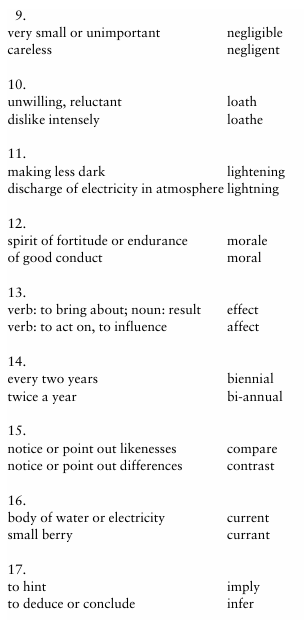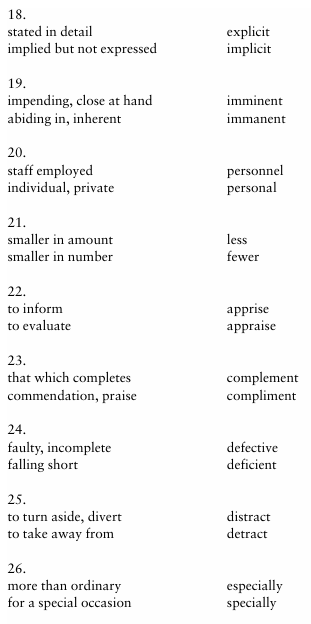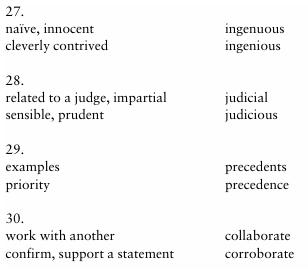Verbal Aptitude Test
The definition of ‘verbal aptitude’ is the capacity for general lexical skills – the understanding of words and the ability to use them effectively. People who possess a high level of verbal skills often excel in fields such as writing (author, journalist, editor, critic), teaching (language, drama), the legal profession (judge, barrister, lawyer) and personnel work (advocate, human resources, counsellor) and as actors, psychologists, interpreters and interviewers. Mastery of words is seen by many as having in one’s possession the ability to produce order out of chaos. Because of this it is argued that command of vocabulary is an essential measure of intelligence, with the result that verbal tests are widely used in IQ testing. Verbal reasoning tests are designed to measure basic verbal aptitude. Typically such tests include spelling, grammar, word meanings, completing sentences, synonyms (words that are the same or similar in meaning to each other) and antonyms (words that are opposite in meaning to each other). The exercises that follow test basic verbal aptitude in a number of disciplines, including synonyms, antonyms, analogy, odd one out and verbal comprehension. For each test a performance assessment is provided. The time limit that is specified for completing each test should not be exceeded; otherwise your score will be invalidated
Test one: General verbal aptitude test – This test is a miscellaneous selection of 30 questions designed to measure language use or comprehension, and your ability to adapt to different types of question.
You have 60 minutes in which to answer the 30 questions.
You should read the instructions to each question carefully before attempting it.
- Which word in brackets is most similar in meaning to the word in capitals?
ERSTWHILE (fallacious, deviant, previous, honest, candid)
- Which word in brackets is most similar in meaning to the word in capitals?
PEDESTRIAN (plinth, ordinary, slow, erudite, rueful)
- Which word in brackets is most similar in meaning to the word in capitals?
TENABLE (believable, alluring, steadfast, delicate,
speculative)
- Which two words are closest in meaning?
rubicund, recurrent, allied, frequent, routine, tolerable
- Which two words are closest in meaning?
strange, formless, hectic, irregular, pallid, angry
Verbal aptitude 7
- Which two words are closest in meaning?
conciliatory, propitious, inspired, fortunate, compatible,
routine
- Which word in brackets is most opposite in meaning to the
word in capitals?
SOOTHE (augment, inflame, ignore, depress, execute)
- Which word in brackets is most opposite in meaning to the
word in capitals?
PROSCRIBE (demolish, stifle, change, unify, allow)
- Which word in brackets is most opposite in meaning to the
word in capitals?
GOAD (resolve, halt, dissuade, warn, retract)
- Which two words are most opposite in meaning?
bright, exemplary, meteoric, fundamental, gradual, level
- Which two words are most opposite in meaning?
superlative, traumatic, subversive, relaxing, crucial,
uncommitted
8 IQ and aptitude tests
- Which two words are most opposite in meaning?
ancient, recant, evoke, maintain, dissent, stand
- Which two words are most opposite in meaning?
susceptible, clandestine, extreme, credulous, banal, immune
- Which is the odd one out?
inch, metre, litre, foot, kilometre
- Which is the odd one out?
adieu, salutation, sayonara, farewell, ciao
- Which is the odd one out?
appendix, prologue, supplement, addendum, postscript
- Which is the odd one out?
immutable, eternal, transitory, imperishable, indelible
- Which is the odd one out?
corporation, entrepreneur, business, firm, conglomerate
- Which is the odd one out?
auburn, chestnut, walnut, carmine, hazel
Verbal aptitude 9
- amplify is to augment as aggravate is to: elevate, maximize,
exacerbate, inflate, proliferate
- Identify two words (one from each set of brackets) that form a connection (analogy), thereby relating to the words in capitals in the same way.
FLORA (vegetation, life, animals)
FAUNA (animals, plants, flowers)
- Identify two words (one from each set of brackets) that form a connection (analogy), thereby relating to the words in capitals in the same way.
APHELION (planet, furthest, distance)
PERIHELION (nearest, sun, orbit)
- Identify two words (one from each set of brackets) that form a connection (analogy), thereby relating to the words in capitals in the same way.
SQUARE (polygon, rectangle, rhombus)
CIRCLE (sphere, diameter, ellipse)
- Identify two words (one from each set of brackets) that form a connection (analogy), thereby relating to the words in capitals in the same way.
SPRING (autumn, flower, bud)
SUMMER (tree, leaf, July)
10 IQ and aptitude tests
- identical is to indistinguishable as comparable is to
(congruous, corresponding, analogous, homogeneous,
symmetry)
- Which two words that sound alike, but are spelled differently,
mean: require / to work or press into a mass
- Which word means the same as the definitions on either side of the brackets?
condition of extreme hardship ( ) to promise or
pledge
- What word can be placed in the brackets so that it forms a word or phrase when tacked on to the end of the first word, and another word or phrase when placed in front of the second word?
double ( ) bar
- Which 3 of the 10 three-letter bits can be combined to produce a word meaning deserving of respect or high regard?
ide, ima, ria, end, est, ent, ard, atu, ble, ile
- Which 3 of the 10 three-letter bits can be combined to produce a word meaning an authoritative rule?
ina, tas, ord, ula, ate, ian, nce, cel, ion, pet
Test one: General verbal aptitude test ( Answers )
1. previous
2. ordinary
3. believable
4. recurrent, frequent
5. formless, irregular
6. propitious, fortunate
7. inflame
8. allow
9. dissuade
10. meteoric, gradual
11. traumatic, relaxing
12. recant, maintain
13. susceptible, immune
136 IQ and aptitude tests
14. litre (it is a measure of capacity; the rest are measures of
length)
15. salutation (it is a welcome; the rest are farewells)
16. prologue (it is at the beginning; the rest are at the end)
17. transitory (it is temporary; the rest are permanent)
18. entrepreneur (it is an individual; the rest are companies)
19. carmine (it is red; the rest are shades of brown)
20. exacerbate
21. vegetation, animals
22. furthest, nearest
23. rectangle, ellipse
24. bud, leaf
25. analogous
26. need / knead
27. plight
28. cross
29. estimable
30. ordinance
Word meanings test
This test measures your ability to distinguish between words that are frequently confused or misused in correspondence and conversation. In each question you are provided with two definitions and two words. You must place each word alongside its correct definition.
You have 30 minutes in which to solve the 30 questions.
1. a type of coarse cloth ____________________________
to solicit votes __________________________________
canvas, canvass
2. noun: one who depends __________________________
adjective: depending on __________________________
dependent, dependant
3. in that place ____________________________________
belonging to them _______________________________
their, there
4. impartial, unbiased ______________________________
lacking interest _________________________________
disinterested, uninterested
5. unbroken, connected ____________________________
frequent, repeated _______________________________
continual, continuous
6. verb: to give an opinion __________________________
noun: opinion given ______________________________
advice, advise
7. how much? ____________________________________
how many? ____________________________________
amount, number
8. verb: to predict _________________________________
noun: prediction ________________________________
prophecy, prophesy
9. very small or unimportant ________________________
careless ________________________________________
negligent, negligible
10. unwilling, reluctant ______________________________
dislike intensely _________________________________
loath, loathe
11. making less dark ________________________________
discharge of electricity in atmosphere _______________
lightening, lightning
12. spirit of fortitude or endurance ____________________
of good conduct ________________________________
moral, morale
13. verb: to bring about; noun: result __________________
verb: to act on, to influence ________________________
affect, effect
14. every two years _________________________________
twice a year ____________________________________
bi-annual, biennial
15. notice or point out likenesses ______________________
notice or point out differences _____________________
compare, contrast
16. body of water or electricity _______________________
small berry _____________________________________
currant, current
17. to hint _________________________________________
to deduce or conclude ____________________________
imply, infer
18. stated in detail __________________________________
implied but not expressed ________________________
explicit, implicit
19. impending, close at hand _________________________
abiding in, inherent ______________________________
immanent, imminent
20. staff employed __________________________________
individual, private _______________________________
personal, personnel
21. smaller in amount _______________________________
smaller in number _______________________________
less, fewer
22. to inform ______________________________________
to evaluate _____________________________________
appraise, apprise
23. that which completes ____________________________
commendation, praise ___________________________
complement, compliment
24. faulty, incomplete _______________________________
falling short ____________________________________
defective, deficient
25. to turn aside, divert ______________________________
to take away from _______________________________
detract, distract
26. more than ordinary ______________________________
for a special occasion ____________________________
especially, specially
27. naïve, innocent _________________________________
cleverly contrived _______________________________
ingenious, ingenuous
28. related to a judge, impartial _______________________
sensible, prudent ________________________________
judicial, judicious
29. examples ______________________________________
priority ________________________________________
precedence, precedents
30. work with another ______________________________
confirm, support a statement ______________________
corroborate, collaborate




